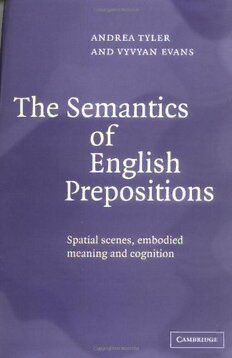
The semantics of English prepositions: spatial scenes, embodied meaning and cognition PDF
268 Pages·2003·1.032 MB·English
Most books are stored in the elastic cloud where traffic is expensive. For this reason, we have a limit on daily download.
Preview The semantics of English prepositions: spatial scenes, embodied meaning and cognition
Description:
Using a cognitive linguistics perspective, this work provides the most comprehensive, theoretical analysis of the semantics of English prepositions available. All English prepositions are originally coded as spatial relations between two physical entities. While retaining their original meaning, prepositions have also developed a rich set of non-spatial meanings. Andrea Tyler and Vyvyan Evans argue that all the meanings are systematically related through a set of cognitive principles, emphasizing the importance of human experience with the world as the foundation for lexical meaning.
See more
The list of books you might like
Most books are stored in the elastic cloud where traffic is expensive. For this reason, we have a limit on daily download.
